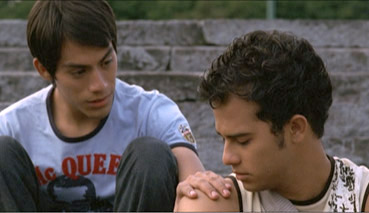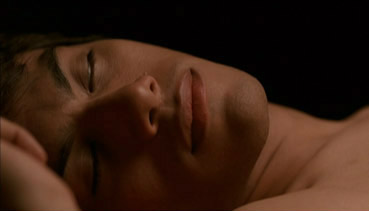|
The
world minimalism gets bandied about quite a bit on this
site, usually by me, and almost always in a positive light.
I'll freely admit to being a fan of minimalist cinematic
storytelling – the polar opposite of the "DO YOU GET
IT?" approach of so many mainstream movies – in
which plot points, character information and even back stories
are often suggested in just a few simple dialogue-free shots.
Of
course with such an approach there's always the risk of
the Emperor's New Clothes scenario, where eager reviewers
read meaning into long silences when in fact there's simply
bugger all taking place, either on a narrative or subtextual
level. It's sometimes difficult to be sure of the facts – is the director
being incredibly subtle or does he or she have nothing to say?
Are they telling their story through suggestion rather than
overstatement, or just doing it very slowly? It's a subjective
call at the best of times and I can't help feeling that
Julián Hernández's Broken Sky [El Cielo dividido] sits somewhere between
these two extremes.

Certainly
there's nothing too complex about the story. University
students Gerardo and Jonás meet on campus and immediately
fall for each other. They're young, they're good looking
and they're full of lust and passion. All seems fine until
Sergio enters the picture and Jonás gives in to temptation,
a fling that affects his feelings for Gerardo. Gerardo knows
something is up, but Jonás is having trouble admitting
the truth. Eventually a wedge is driven between the two
lovers, but as Sergio realises what he has lost, it's Gerardo
who finds comfort in Sergio's arms.
OK,
love stories are not exactly renowned for their complex
narratives and too often consist of the following steps: boy
and girl meet, they fall in love, their relationship
is tested by incident or infidelity, love eventually triumphs and boy
and girl live forever in a cloud of domestic bliss. Broken
Sky may be a gay love story, but for the most part
the pattern is roughly the same. The difference, the REAL difference,
is in the handling, and that's where the audience divisions
appear to have set in. If you want a definition of minimalist
storytelling then Broken Sky will certainly
supply that for you, with the narrative simplicity intensified
by director Hernández's decision to play the film
largely without dialogue – I doubt the characters say more
than forty words to each other over entire course of the film. This
inevitably gives each scene a slightly artificial quality,
with the actors required to convey through movement and
expression what they would normally be expected to do with
speech, shifting some sequences away from naturalism and
towards the symbolic physical expression of a dance piece.
It's a bold strategy that risks distancing the audience
from the film's two young protagonists, but after a while
proves surprisingly involving, thanks largely to a pair
of finely judged performances from Fernando Arroyo and, especially,
Miguel Ángel Hoppe. The pair effectively communicate the
passions and emotional turbulence their characters experience,
caught in revealing close-ups and observational mid-shots
by Alejandro Cantú's fluid, evocatively lit cinematography.
This
non-verbal communication effectively trims the fat from
a simple story, but this fat is then strapped back on through
a process of dramatic repetition, with no opportunity missed
in the first third to show the young couple expressing affection
for each other, hammering home their feelings in a way that a more tightly constructed film could communicate
just as well in a fraction of screen time (having recently
marvelled at the cinematic economy of It's
Winter, I can't help thinking that Rafi Pitts
could accomplish this in about three shots). There is almost
a sense that director Hernández is so entranced by
his leading men that he just kept on adding scenes that
he didn't have the heart to later remove, and at two hours
twenty minutes the point will for many feel wearily laboured.
The subtlety of the storytelling is also intermittently
undermined by a rather clunky voice-over that points out
the obvious for anyone who's not been following the plot, plus songs whose
lyrics too closely echo what's happening on screen. And
I can't be the only one who felt that Alejandro
Rojo, who plays Sergio, was partly cast and made up to look like a biblical
incarnation of Temptation, a minor demon in human form sent
to intervene in a relationship that the Catholic church would
frown on.

Broken
Sky is an intriguing and in some ways admirable
attempt at a different approach to a familiar story that
is likely to mesmerise some but exhaust the patience of
others. There is no doubt that the film communicates the
jealousies and hurt that comes with almost any relationship
worth fighting for – I'm just not convinced it needed 139
minutes to do it.
The anamorphic 1.73:1 transfer is pretty good on detail
and appears to have naturalistic colours and a decent contrast
range, but is clearly an NTSC to PAL conversion, betrayed
by the judders on fast movement and the double-image freeze-frames.
Black levels are fine throughout.
The
soundtrack is Dolby 2.0 stereo only, which works fine for
the film's use of silence and proves lively enough when
need by, particularly in the night club scenes, where Decadia
2's nicely used El cielo dividido displays surprisingly
strong bass. Separation is also distinct in places.
Identity
(11.39)
A short film devised as a prequel to Broken Sky using the same lead actor. Whether it really adds much to
the back-story is another matter. The film was shot silent
and set to a jazz piece – the music carries the moniker Identity, while the film's title appears to actually
be 'I Will Sleep When I Am Dead'. The picture
is letterboxed, but anamorphic encoding stretches it out
(just manually override this), and is not of the same quality
as the feature.
There
are also the usual Trailers for
other Peccadillo film and DVD releases.
An
intriguing experiment that may well find a small but appreciative
audience, despite what some of the openly hostile comments
on the IMDb might suggest. Peccadillo's DVD is very watchable,
but loses a few points for the NTSC to PAL transfer.
|